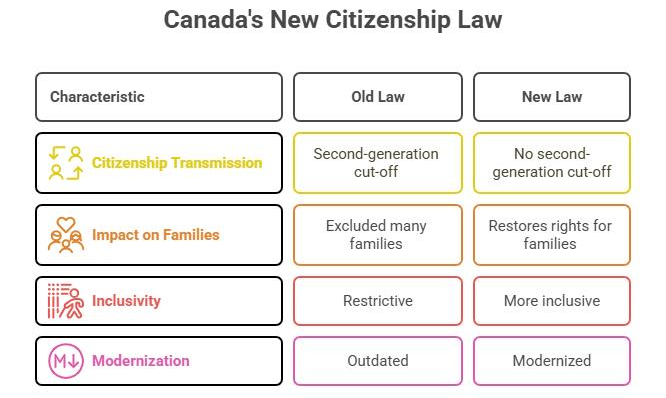Context:
Background:
-
- Individuals who were denied or lost citizenship due to gaps, discriminatory provisions, or outdated clauses in earlier Canadian laws.
- The 2009 first-generation limit allowed citizenship by descent only for children whose Canadian parent was born in Canada or naturalised.
- Those born abroad to Canadian parents who themselves were also born abroad (second generation abroad) were excluded.
- A 2023 court ruling deemed this discriminatory, prompting legislative reform.
- Individuals who were denied or lost citizenship due to gaps, discriminatory provisions, or outdated clauses in earlier Canadian laws.
Key Features of the New Law (Bill C-3):
a) Removal of the First-Generation Limit
-
-
- Any child born or adopted abroad to a Canadian parent can acquire citizenship—remedying the earlier generational cut-off.
- Any child born or adopted abroad to a Canadian parent can acquire citizenship—remedying the earlier generational cut-off.
-
b) Retroactive Recognition
-
-
- Citizenship is restored retrospectively to people who were excluded earlier—benefiting thousands of “Lost Canadians.”
- Citizenship is restored retrospectively to people who were excluded earlier—benefiting thousands of “Lost Canadians.”
-
c) Substantial Connection Requirement
-
-
- For future births abroad, parents must prove 1,095 days (3 years) of physical presence in Canada before the child’s birth/adoption.
- Ensures that the parent maintains a meaningful link with Canada.
- For future births abroad, parents must prove 1,095 days (3 years) of physical presence in Canada before the child’s birth/adoption.
-
d) Safeguards
-
-
- Exclusion for individuals involved in fraudulent citizenship renunciation or serious criminality remains.
- Exclusion for individuals involved in fraudulent citizenship renunciation or serious criminality remains.
-
Rationale and Policy Logic:
-
- Correct historical discrimination and ensure equality in transmission of citizenship.
- Respond to a globalised world where families increasingly live, work, and have children abroad.
- Strengthen diaspora networks and Canada’s soft-power outreach.
- Align Canadian law with contemporary human-rights standards and judicial mandates.
- Correct historical discrimination and ensure equality in transmission of citizenship.
Implications for Indian-Origin Families:
a) Who Benefits?
-
-
- Indian-origin Canadian citizens working abroad whose children were previously denied citizenship.
- Families who left Canada for education, employment, or temporary foreign postings.
- Some “lost Indian-Canadians” may now gain automatic citizenship recognition.
- Indian-origin Canadian citizens working abroad whose children were previously denied citizenship.
-
b) Future Births
-
-
- Indian-origin Canadian parents born abroad can pass citizenship to future overseas-born children if they meet the substantial connection rule.
- Indian-origin Canadian parents born abroad can pass citizenship to future overseas-born children if they meet the substantial connection rule.
-
c) Interaction with Indian Law
-
-
- India does not permit dual citizenship.
- Individuals acquiring Canadian citizenship must surrender Indian citizenship and shift to OCI status.
- Families must weigh the benefits of Canadian citizenship against the loss of Indian nationality.
- India does not permit dual citizenship.
-
d) Possible Increase in India–Canada Mobility
-
-
- Could encourage return migration to Canada or long-term diaspora consolidation.
- Might also affect educational and professional migration patterns.
- Could encourage return migration to Canada or long-term diaspora consolidation.
-
Conclusion:
Canada’s new citizenship-by-descent law marks a major shift toward inclusive, rights-based citizenship. By recognising “Lost Canadians,” the reform rectifies historical injustices and adapts to the demands of a globalised world marked by transnational mobility.







